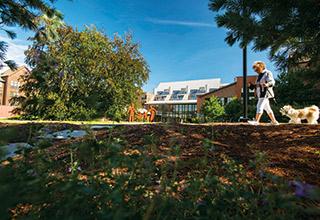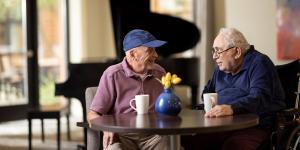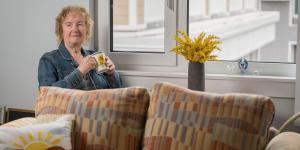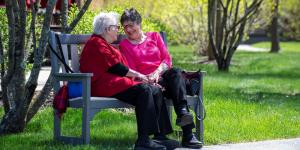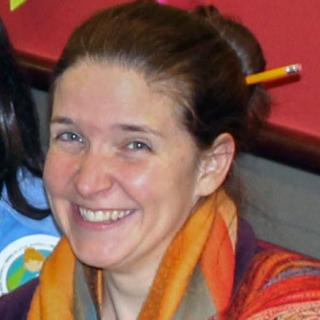How to Live Well While Aging Solo
“What you can do to plan for the future when you can't rely on family”
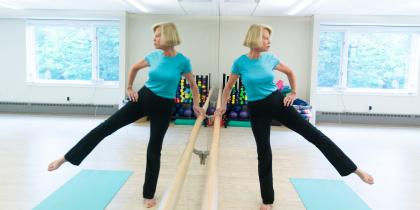
“Why aging alone doesn't mean being alone”
Life’s journey is a rich experience complete with its ups and downs, accomplishments and setbacks, gains and losses. In the end, how we respond to life’s opportunities, as well as its challenges, helps shape our destinies. One constant upon which we can rely is that everything eventually changes. As we grow older, priorities shift, and we face new decisions about how to negotiate our lives.
As with any phase of life, planning for the future as we grow older is important if we want to exercise as much control as possible over our quality of life. And those older adults who fall within a category known as “solo aging” face a unique set of circumstances to consider as they anticipate what comes next and decide what truly matters to them in old age.
What is solo aging?
Whether by choice or due to circumstances such as divorce or death of a partner, 27% of adults ages 60 and older live alone in the US. About half of women 65 and older do so. But those who fall within the solo aging category have yet another challenge that sets them apart. They have no children or close relatives upon whom they can depend to make critical legal, medical, or financial decisions should they be unable to do so themselves.
When you look at statistics, the number of older adults who will find themselves solo aging is destined to grow significantly. Baby boomers, born between 1946 — 1964, came in a close second to millennials as the largest percentage of the population in 2021 according to US census data. The first baby boomers will turn 80 in 2026, and all boomers will reach 65 by 2030. The rate of childlessness among baby boomers now in their 50s and 60s is close to 20%.
How one solo ager is planning her future
Although boomers represent a significant bulge in the number of solo agers, many older adults already find themselves among this demographic rank. An example is Janet Donnoe, a resident at Orchard Cove, a Hebrew SeniorLife senior living community in Canton, MA.
Janet, pictured above, was always an independent woman. With a background in social psychology and research, she was well equipped to understand the importance of making decisions that would ensure her future as a solo ager while she was still relatively young, healthy, and independent. And she thought she knew what she needed to put in place. But it hasn’t always been easy, and she admits that she’s faced a learning curve as she’s worked to understand what she might face as she gets older and what resources will be available to ensure that her personal priorities will be understood and respected. She wants to control the things that are most important to her quality of life as she ages, like safety and well-being, as well as support for her interests and lifestyle preferences.
“When I turned to medical industry, financial, and legal advisors, I discovered that they assume you’ll have a family that will support you. The questions they ask, and the assumptions they make don’t match me,” says Janet.
One important decision that tops the list from expert advice to solo agers is to consider a move to a continuing care retirement community. And that was one of the first steps that Janet took to secure her future.
“You need to plan ahead if you want to have a say over what will happen,” says Janet. “Not knowing where I would go, I ended up doing my own search for a community where I felt I could age in place comfortably on my own.
I was still working in my early 60s when I started actively looking. I knew what it took to move and that I didn’t want to do it in my 80s. I wanted to have the mobility and stamina needed to create an enjoyable and organized living space at the place I would call home — down to the view outside my window, how my things were displayed, and where my furniture would go.
I moved to Orchard Cove earlier than planned and am happy with the decision — more so as I have become sensitive to the concerns faced by people who live alone in environments that don’t fit their needs — for example in a home that’s too big or that isn’t close to transportation that supports their interests and daily activities. Living at Orchard Cove has unburdened me in that respect.”
Janet cautions that knowing what questions to ask and finding the best answers are key to successful solo aging. “As solo agers, we need to feel empowered to discuss the implications of aging for the quality of our lives, look at our options, and determine what’s important to us,” says Janet. “But it’s also important to understand what will be important in the future, which means continuing the conversation as your perspective changes.
Something can happen and you may suddenly feel particularly vulnerable. What are you going to do if this happens to you? This is a very hard question, and our support systems aren’t always structured to give you answers. There are many moving parts and possible gaps in support.”
Feeling vulnerable is not just about comfort and security. Living alone with no children or close relatives can also be isolating. When Janet started her search for a senior living community, she was looking for a community that she felt was well-matched to her — location, ambiance, amenities, quality, and a place where she felt she fit in.
“It’s like putting on a pair of shoes,” says Janet. “Keep looking until you find a pair that are comfortable. You might not know why they’re comfortable but you’ll just know when they’re right.
I enjoy the Orchard Cove community — filled with people who are accomplished, down-to-earth, from different backgrounds, and have diverse interests and talents.”
As Janet continues to learn what “she doesn’t know” about solo aging she is putting supports in place that will help her negotiate the inevitable changes that life brings with time. She has identified an Aging Life Care Professional to help refine her plans and serve as her advocate when her capabilities decline, named an individual who has power of attorney, and has a living will in place that she knows must be continuously evaluated as conditions change.
Questions you should ask yourself if you’re a solo ager
Janet is a successful case study as an individual who asked herself many of the questions industry experts advise older adults to consider if they live alone without children or other relatives to provide support. I’m sure she would agree with me that solo agers should consider the following when planning for their futures and, as Janet did, start planning sooner rather than later.
Answering the following questions can help you develop or strengthen your safety net as you grow older.
- Have you taken the time to ask yourself “what matters most” to you? What constitutes a “good day” for you? Where do you want to focus your energy and passion as you live your life?
- In what type of setting do you want to live? What environment and amenities will help you live your best life?
- Have you considered finding a life care manager who can act as your advocate and advise you on the best medical care and lifestyle options available to meet your personal goals for living?
- Do you have a health care proxy in place who will make sure your wishes for medical care are followed should you be unable to make your own decisions? Have you completed a MOLST (Medical Orders for Life Sustaining Treatment) to make your medical choices known? Read more about advance care planning on our blog.
- Do you have a financial plan in place should you need additional resources, for instance to pay for an in-home caregiver or personal assistant?
- Do you have adequate medical insurance, and are you aware of resources available to you if your financial resources are limited?
- Do you have someone who has power of attorney to address financial or legal issues and make or help you make decisions, and do you trust this person to make decisions with your best interests in mind?
- Are you thinking about estate planning? Where will your assets go? Do you have a favorite charity that could benefit from a gift from your estate?
At Hebrew SeniorLife, each resident comes with a unique set of needs and expectations, and we work hard to anticipate and meet those needs to make sure everyone lives their best lives in environments where they feel safe and secure.
At Orchard Cove, we support your best life by starting with the question “what matters most to you.” Through a partnership with a coach on staff as part of our wellness coaching program, you have the opportunity to engage in ongoing meaningful conversations throughout your life at Orchard Cove. Through these conversations you can articulate “what matters most to you” and create a plan to make the lifestyle and care decisions that matter most to you. Your coach, and the entire team of Orchard Cove, is here to help you feel empowered and activated in setting the path for your own life.
As changing care needs arise, we have a team who is here to help guide the decisions which match your preferences and needs, whether it is supplemental care in your apartment, or making the decision to transition through our continuum of care.
Resources for solo agers
As more older adults find themselves solo aging, available resources to support them are also evolving. You may find helpful information at the following websites:
- The Aging Life Care Association can help you find an Aging Life Care Professional, also known as a geriatric care manager, to guide you through aging and help you understand the choices available to you.
- The Conversation Project offers toolkits and conversation starts for helping you share your wishes for care through the end of life.
- Dr. Atul Gawande’s best-seller Being Mortal is a thought-provoking book about what it means to live a “good life” as we age. (It even features Orchard Cove and our sister community at Hebrew SeniorLife, NewBridge on the Charles in Dedham, MA!)
- Janet recommends the book Essential Retirement Planning for Solo Agers by Sara Zeff Geber, PhD, which provides a retirement and aging road map and offers checklists for planning the rest of your life.
- AARP offers information about what a power of attorney is and how to put documentation in place.
- The Massachusetts MOLST, which stands for Medical Orders for Life-Sustaining Treatment, is a medical document that contains current medical orders about life-sustaining treatments. It’s a good idea to have both the MOLST and a health care proxy, which is a legal document.
- The Navigating Solo Network offers educational resources, advocacy initiatives, and opportunities to connect with other solo agers.
Living options for solo agers
Just as Janet described, many solo agers find themselves attracted to continuing care retirement communities like Orchard Cove and NewBridge on the Charles. Whether it’s the companionship, amenities, or diverse programming, there are many advantages to living in a place where it’s easy to build relationships and find personal growth.
Senior living communities can also offer a more secure financial future — once you move in, you won’t need to worry about surprise home maintenance costs or the fluctuating value of real estate. Our communities also offer an extensive range of health care options, should your needs change.
If you’re planning your future as a solo ager and are interested in learning about our senior living options, we are always happy to have a conversation. Contact us online or call 781-859-3088 to learn more.
Blog Topics
Learn More
A Community for Residents, By Residents
Orchard Cove, in Canton, MA, offers living options that span the full continuum of care, including independent living. The community is bustling with activities, from life-long learning to entertainment.
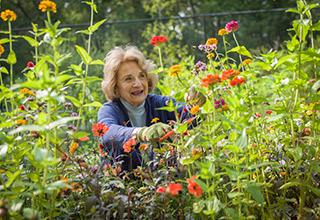
Luxurious, Intergenerational Living
At NewBridge on the Charles in Dedham, MA, you'll find modern senior living on a 162-acre intergenerational campus. We offer a complete continuum of care to support your best life, as you define it.
